work&life in Japan | N1 related study | tea addict and art enthusiast
Don't wanna be here? Send us removal request.
Text
証券会社とは?
例:株価が暴落したとあって、証券会社は大騒ぎだ。(友松悦子他. 新完全マスターN1. 文法. 2011, p.55.)
株価(かぶか)stock prices 暴落する(ぼうらく)to crash, to fall heavily 証券(しょうけん)securities 大騒ぎ(おおさわぎ)uproar
英訳:"With the stock market crashing, securities companies are in an uproar."
「証券会社」の定義:
証券会社は、個人投資家や法人投資家の間で行われる証券の売買を仲介する役割を担う金融機関です。彼らは株式や債券、投資信託などの金融商品を扱い、投資家がこれらの証券を取引できるようにサポートします。証券会社は、主にブローカー業務を通じて手数料を収益源とし、投資情報の提供や投資アドバイスを行うこともあります。また、国内外の市場を通じて迅速かつ効果的に取引を実現するために、最新のマーケット情報や技術を活用しています。(コトラ. "初心者でもわかる!投資銀行と証券会社の違いとは". KOTORA JOURNAL. 2024-1-28. https://www.kotora.jp/c/39593-2/ (参照:2025-8-16).
個人投資家(こじんとうしか)individual investor, private investor
法人投資家(ほうじんとうしか)institutional investor
売買(ばいばい)buying and selling, trading
仲介する(ちゅうかい)to mediate
役割を担う(やくわり を になう)carry a role
金融機関(きんゆうきかん)financial institution
株式(かぶしき)share, stocks
債券(さいけん)bond
投資信託(とうししんたく)mutual fund, investment trust
金融商品(きんゆうしょうひん)financial product
取引する(とりひき)to trade
収益源(しゅうえきげん)revenue source
英訳:"Securities companies are financial institutions that act as intermediaries in the trading of securities between individual and institutional investors. They handle financial products such as stocks, bonds, and investment trusts, and support investors in trading these securities. Securities companies primarily generate revenue through brokerage services and may also provide investment information and advice. Additionally, they utilize the latest market information and technology to enable swift and effective trading through domestic and international markets."
#studyblr#langblr#japanese langblr#japan#japanese#japanese language#japanese vocabulary#study japanese#studying#study motivation#jlpt n1#study notes#study blog#study inspiration#living in japan#working#working in japan
6 notes
·
View notes
Text
I absolutely love how easily you can call out any type of harassment in the Japanese language - plus, it being colloquially understood!
Thank you for compiling a list! It was fun reading through them all. While they are indeed useful for pointing out serious social imbalances, I can't wait to complain about ヌーハラ next time I'm out with my friends~🍜
Harassment in Japanese
A list of the types of harassment in Japanese.
Note: There are obviously some triggering things in here, so please skip if you think that descriptions of forms of harassment might cause you distress.

あ
アカハラ/Aka-Hara Academic Harassment (アカデミックハラスメント) Situations where professors or superiors in an academic setting take advantage of their position to harass or prevent the academic development of a student. This includes preventing them from using equipment without just cause, or not giving students credit for their work.
アルハラ/Aru-Hara Alcohol Harassment (アルコールハラスメント) Any kind of forced alcohol consumption can be considered alcohol harassment. Hazing, bullying, using hierarchy to force someone to drink, or not arranging for non-alcoholic drinks all constitute alcohol harassment.
エアハラ/Ea-Hara Air Harassment (エアーハラスメント) Otherwise known as air-conditioning harassment. Companies prohibiting the use of air conditioning on hot days to save on energy costs or setting the temperature so low that employees feel uncomfortable because it's too cold.
エイハラ/Ei-Hara Age Harassment (エイジハラスメント) Age harassment has many forms. Originally it meant the harassment of middle-aged or older members of the workforce specifically because of their age; however, it has been expanded to include age-discrimination in job requirements (e.g. restricting the age of applicants for no just cause) and the harassment, harm or neglect of elders in the home or in nursing homes.
オワハラ/Owa-Hara Stop (One's) Job Search Harassment ((就)終われハラスメント) Taking advantage of the insecurity of job seekers by verbally promising them a job under the condition that they stop seeking other opportunities.
か
カジハラ/Kaji-Hara Housework Harassment (家事ハラスメント) Unbalance, disrespect, or excessive badgering with respect to the division of household chores and other domestic duties in the home.
カスハラ/Kasu-Hara Customer Harassment (カスタマーハラスメント) Inappropriate or disrespectful behavior by customers towards service staff. For example, making unreasonable requests, refusing to pay for services or any other kind of verbal or physical abuse.
カラハラ/Kara-Hara Karaoke Harassment (カラオケハラスメント) When someone uses their position of authority at work to force people to sing at karaoke when they don’t want to. While karaoke is considered a social activity and for some it is a way to relieve stress, there are many who do not enjoy karaoke and find it embarrassing to sing in front of others.
キャンハラ/ Kyan-Hara Campus Harassment キャンパスハラスメント) Any kind of harassment that occurs on a university campus falls under the umbrella of campus harassment, including but not limited to: sexual harassment, academic harassment, and power harassment. The difference between campus harassment and academic harassment is that the former can occur between peers and colleagues and is not limited to teacher-student interactions.
ケアハラ/Kea-Hara Care Harassment (ケアハラスメント) Harassment in the workplace towards those who take leave or work fewer hours in order to care for family members.
さ
シルハラ/Shiru-Hara Silver Harassment (シルバーハラスメント) Silver harassment is similar to age harassment and refers to older people, but more specifically refers to harassment of those receiving elder care. The “Silver Generation” refers to those who are above the age of 60, and harassment of this population tends to happen in the form of bullying, neglect, or outright abuse by those taking care of them (e.g. family or nursing home staff). This is a growing problem in Japan due to the aging population.
ジェンハラ/Gen-Hara Gender Harassment (ジェンダーハラスメント) When traditional gender roles are imposed upon people in the workplace. E.g. forcing only women to serve tea, expecting men to be dominant or leaders in a project or a team or to be responsible for physical labor. Gender harassment also includes discrimination or harassment of LGBTQ individuals.
スクハラ/ Suku-Hara School Sexual Harassment スクールセクシャルハラスメント) Sexual harassment of students by teachers at school. This includes such things as asking a student if he/she is dating, using one's position to prohibit dating, or inappropriate physical contact with a student that can be considered sexual abuse. Often times school administration may not be equipped or receptive to such claims made by students, therefore it is advised to contact a third-party organization for victim support.
スメハラ/Sume-Hara Smell Harassment (スメルハラスメント) Smell Harassment is the act of making others uncomfortable with smells. Body odor or bad breath may be common but also the overuse of perfume or fabric softener can be considered smell harassment.
スモハラ/ Sumo-Hara Smoke Harassment (スモークハラスメント) Harassment of nonsmokers by smokers. When a smoker forces a nonsmoker to smoke or be exposed to second-hand smoke. In addition, some have extended smoke harassment to include the undue burden placed on non-smokers in the workplace because smokers take significantly more breaks implying that non-smokers work longer or end up doing more work than smokers.
セクハラ/Seku-Hara Sexual Harassment (セクシャルハラスメント) When unwanted or inappropriate sexual comments or physical contact is made in the workplace.
セカハラ/Seka-Hara Second Harassment (セカンドハラスメント) When a victim of sexual harassment reports the abuse to their company or superior and is secondarily harassed to stay silent or otherwise ignored or threatened.
ゼクハラ/Zeku-Hara Zexual Harassment (ゼクシャルハラスメント) Passive aggressive or direct pressure from a woman to a man to get married. The term zexual comes from the bridal magazine Zexy. Social pressure on women to get married is consequently transferred to their current partners and is known as zeku-hara.
ソーハラ/So-Hara Social Media Harassment (ソーシャルメディアハラスメント) Any kind of discomfort or pressure caused by colleagues or superiors with regard to social media. Insisting on follows or engaging on social media or using people’s social media posts against them in the workplace.
た
継ぐハラ/Tsugu-Hara Inheritance (of a family business) Harassment (継ぐんでしょうハラスメント) Pressure from parents or relatives to take over a family business despite the preferences of the individual.
テクスハラ/ Tekusu-Hara Textual Harassment(テクスチュアルハラスメント) Textual harassment is the unfair degrading or ignoring of a work or evaluation of a person who is a woman or because of her gender. In particular, it refers to the evaluation of a work by a female writer being lower rated than that of a male writer, or the evaluation of a work being based on the gender of the writer, rather than on the quality of the work.
テクハラ/ Teku-Hara Technology Harassment (テクノロジーハラスメント) Technology harassment is the harassment of people who are not tech-savvy. Especially older members of the workforce may not be as well versed in using technology. While the job might require a certain amount of competency in technology, not allowing people the time to learn or belittling them for their lack of skills is considered technology harassment.
ドクハラ/ Doku-Hara Doctor Harassment(ドクターハラスメント) Discomfort or mental stress caused to a patient by the words, actions, attitude, or atmosphere of a doctor treating a patient. This can include anything from dismissive comments like "If you don't trust me, go somewhere else," or forced treatment or examination despite hesitation by the patient.
な
ヌーハラ/Nu-Hara Noodle Harassment (ヌードルハラスメント) It is common to audibly slurp one’s noodles while eating in Japan. Some find the sound unsettling and in certain situations eating one's noodles noisily can be considered noodle harassment.
は
ハラハラ/ Hara-Hara Harassment Harassment (ハラスメントハラスメント) Harassment harassment is the act of embarrassing or harassing someone by claiming that words, actions, or behavior that are not actually harassment are "harassment." This can worsen human relationships within an organization and reduce work efficiency.
パーハラ/ Pā-Hara Personal Harassment (パーソナルハラスメント) Any kind of bullying or attacks that are personal in nature (e.g. in reference to personal taste, appearance, habits, personality, etc.).
パワハラ/ Pawa-Hara Power Harassment (パワーハラスメント) When someone in a position of power in the workplace uses that power to harass or bully a person in a lower-ranked position.
フォトハラ/Foto-Hara Photo Harassment (フォトハラスメント) Taking photos without a person's permission, uploading the photo to social media without permission, or any other use of photographs to intentionally cause discomfort, harm, humiliation, distress, or danger.
ブラハラ/ Bura-Hara Blood Type Harassment (ブラッドタイプハラスメント) In Japan, many believe that one’s blood type has an influence on a person’s personality, also known as blood type horoscopes. Blood type harassment refers to words, actions, or judgments of a person’s personality or capability based on their blood type. For example, Type O is careless, Type A is meticulous, etc. Not only is there no evidence for the validity of blood type horoscopes but deciding people’s work responsibilities and tasks based on blood type is harassment.
ペットハラ/ Petto-Hara Pet Harassment (ペットハラスメント) Pet harassment has two variations.
Abuse or neglect of one’s pet
Improper maintenance of one’s pet in public that causes fear or discomfort to people who are afraid of animals.
ま
マタハラ/Mata-Hara Maternity Harassment (マタニティハラスメント) Harassment of a woman who is pregnant or has given birth, either mentally or physically, on the grounds that her pregnancy, childbirth, or parental leave is interfering with her work duties.
マリハラ/Mari-Hara Marriage Harassment (マリッジハラスメント) Marriage harassment refers to the constant pestering of unmarried to get married, by colleagues, superiors, work, relatives, and peers.
モラハラ/ Mora-Hara Moral Harassment (モラルハラスメント) Moral harassment is harassment that causes mental pain to the other person through words, attitudes, and actions. Specifically, it includes ignoring the other person, using abusive language, acting in a bad mood, or forcing or taking away work. When a person is mentally harassed through words and attitudes, in the workplace this often manifests as not receiving recognition for work. This kind of harassment is often concealed and happens in private.
ら
ラブハラ/ Rabu-Hara Love Harassment ラブハラスメント Emotional distress or discomfort caused to a person in relation to the topic of love or relationships. Asking about one’s dating situation or unsolicited advice about dating, relationships, or marriage.
リスハラ/ Risu-Hara Restructuring Harassment (リストラハラスメント) A form of power harassment that forces employees into departments, positions, or locations they are not necessarily suited for. When decisions regarding one’s working conditions are deliberately made to make the employee experience discomfort or hardship.
リモハラ・テレハラ/ Remo-Hara or Tele-Hara Remote Harassment/Telework Harassment (リモートハラスメント・テレワークハラスメント) A new type of harassment has emerged with the spread of remote work during the pandemic. As many people’s personal spaces became visible to colleagues and superiors, it resulted in an undue invasion of personal privacy. In addition, people were forced to join online drinking sessions or were excluded from necessary meetings. All of the above fall under the umbrella of remote harassment.
レイハラ/ Rei-Hara Racial Harassment (レイシャルハラスメント) Racial harassment is the act of insulting or harassing someone on the basis of race, ethnicity, nationality, etc. It refers to a situation in the workplace or in everyday life where an employee is subjected to discriminatory remarks or actions or unfair treatment on the basis of race or nationality, resulting in a harmful working environment.
レリハラ/ Reri-Hara Religious Harassment (レリジャスハラスメント) Harassment by religious officials involving emotional, physical, or financial distress. It may include pressure to join a religious group, threats of severe consequences if one tries to leave a religious group, or sexual or child abuse that occurs within a religious group. Interestingly, this term is not used for people who get discriminated against because of their religion.
ロジハラ/ Roji-Hara Logical Harassment (ロジカルハラスメント) Logical harassment is harassment that uses logic and reason to mentally corner the other person. It refers to acts that cause mental pain to the other person by presenting logical arguments, confusing them, or taking away their confidence.
わ
ワクハラ/ Waku-Hara Vaccine Harassment (ワクチンハラスメント) Forcing someone to get vaccinated or making remarks or behaving in a way that blames them for not being vaccinated. It is an abbreviation for vaccine harassment, and the term "wakuhara" has become more common in the workplace amid the influence of COVID-19.
Note: There are other types of harassment, each with their own catchy four-syllable (or so) phrase. While Japan recognizes a lot of harassment types, the policies for combating harassment aren't always strong enough to support the victims. I provide this list in case you need help describing harassment you are facing, and to shine a light on some of the issues facing Japanese society.
Original Source
100 notes
·
View notes
Note
どうやって日本語の単語を覚えますか?
質問ありがとうございます〜🎶
以前は、何度も声に出して読み上げたり、何度も書き留めたりして単語を学びました。現在は、職場で日々日本語のコミュニケーションを取ることで、自然的に単語を身につけてこられます。つまり、同じ単語を何度も聞き取ったら、またはメールから読み取ったら、結局覚えてくるはずですね!
ちなみに、ポッドキャストを聞くことや簡単な小説を読むことで日本語の勉強が最適化できる自信を持っています!
ただし、どうしても覚えられない単語や表現があれば、付箋に書いて仕事用のパソコンに貼っておきますよ~笑
6 notes
·
View notes
Text
✤2025年6月16日
名詞 // Nouns:
政策(せいさく)policy 党(とう)political party
動詞 // Verbs:
打ち出す(うちだす)to work out, to hammer out, to come out with 奪う(うばう)to rob, to take away 手間取る(てまどる)to take a long time 反省する(はんせい)to reflect (on oneself) 読み合わせる(よみあわせる)to read out and compare/check
形容詞 // Adjectives:
乏しい(とぼしい)meagre, to be lacking
その他 // Other:
政権を奪われる to be robbed of political power 政策を打ち出す to come forward with a policy 知識が乏しい to be lacking in knowledge 理解に手間取るかもしれません It might take a long time to understand
15 notes
·
View notes
Text
✤2025年4月19日
名詞 // Nouns:
慣用句(かんようく)idiom 行動力(こうどうりょく)ability to take action 死別(しべつ)bereavement 発話(はつわ)utterance
動詞 // Verbs:
足を引きずる(あし を ひきずる)to limp 可愛がる(かわいがる)to be affectionate 行動に移す(こうどう に うつす)to act out しゃがみ込む(しゃがみこむ)to crouch down 張り裂ける(はりさける)to burst (open) 引きずる(ひきずる)to drag, to pull (along) 引っ張る(ひっぱる)to pull (tight) ぼんやりする to idle, to be absent-minded
形容詞 // Adjectives:
慣用的(かんようてき)idiomatic 独断的(どくだんてき)dogmatic, arbitrary 悲観的(ひかんてき)pessimistic 平凡な(へいぼん)ordinary
形容動詞 // Adverbs:
どうも somewhat ともすれば being prone to ぼんやりと idly
その他 // Other:
頭で考える(あたま で かんがえる)to think with one's head 肩をたたく(かた を たたく)to pat on the shoulder この時とばかりに(このとき)"make hay while the sun shines" (=taking an unexpected opportunity) その場(そのば)on the spot, right then and there 他人の足を引っ張る(ひっぱる)to hold others from achieving success, to stand in the way of others 他人を批判する(ひはん)to judge other people 動物を可愛がる(どうぶつ を かわいがる)to love/cherish animals 涙ながらに(なみだながらに)under tears 部屋に鍵をかける(へや に かぎ を かける)to lock a room 物事を大袈裟に言う(ものごと を おおげさ に いう)to exaggerate things
23 notes
·
View notes
Text
メディアやSNSは、人の興味を引かせるために、ネガティブな情報を流すことで、視聴率を稼いだり、アクセス数を増やそうとしています[…]。(武田双雲. 「ありがとう」の教科書. 2022, p.7.)
人の興味を引かせる (ひと の きょうみ を ひかせる) to capture people's interest/attention ネガティブな情報を流す (ねがてぃぶな じょうほう を ながす) to spread negative information 視聴率を稼ぐ (しちょうりつ を かせぐ) to gain viewership アクセス数を増やす (あくせすすう を ふやす) to increase number of hits/visits, to increase traffic
"Media and social networking services are trying to gain viewership and increase traffic by spreading negative information in order to attract people's interest."
#studyblr#langblr#japanese langblr#japanese language#learning japanese#japanese vocabulary#study japanese#japanese media#japanese books#books and reading#books#booklr#book quotes#book quotations#light academia#social media#japan
23 notes
·
View notes
Text
小説の語彙力(3)
名詞 // Nouns:
行きつけのバー(いきつけ)my go-to bar 会食(かいしょく)dining together 結婚披露宴(けっこんひろうえん)wedding reception banquet 用件(ようけん)business, thing to be done
動詞 // Verbs:
はしごする going several places in succession (as in barhopping) 控える(ひかえる)refrain 披露する(ひろう)announce, reveal, showcase
形容詞 // Adjectives:
上機嫌な(じょうきげん)cheerful, in a good mood 他愛ない(たわいない)foolish ちょっとした minor, trivial, petty
その他 // Other:
急ぎではない(いそぎではない)not in a hurry こちらから / こっちから from my side 電話をかける make a phone call 電話を切る hang up, end a telephone conversation 仕事で外回りがある(そとまわり)have work outside the office 深くは気に留めない(ふかくは き に とめない)not care deeply
#小説の語彙力#語彙リスト#japanese langblr#langblr#japanese language#language learning#japanese vocabulary#japanese studyblr#japanese#japan#learning japanese#reading in japanese#study notes#study japanese#studying#study motivation#nihongo#日本語#日本語の勉強
38 notes
·
View notes
Text
オフィスで耳にした単語(1)
名詞 // Nouns
演習(えんしゅう)practice 開発費(かいはつひ)development cost 奇数(きすう)uneven number 後半(こうはん)latter half 借金(しゃっきん)debt, loan 実践(じっせん)practice, implementation 消防設備点検(しょうぼうせつびてんけん)Fire Safety Equipment Inspection 消防(しょうぼう)fire fighting 設備(せつび)equipment 前半(ぜんはん)first half 貸与(たいよ)loan, lending 点検(てんけん)inspection 添付ファイル(てんぷ)attached file 備品(びひん)fixtures, furnishing, equpiment 部署(ぶしょ)department 予算(よさん)budjet
動詞 // Verbs
該当する(がいとう)meet (qualifications), falling under, being applicable 加担する(かたん)assist, participate, support 換算する(かんさん)convert (currency) 記載する(きさい)list, note, record 計算する(けいさん)calculate 実施する(じっし)carry out 借金する(しゃっきん)borrow money 出社する(しゅっしゃ)go to the office 請求する(せいきゅう)demand, charge, bill 使いこなす(つかいこなす)handle, master 投資する(とうし)invest 並び替える(ならびかえる)arrange 配布する(はいふ)distribute 儲ける(もうける)make profit, earn
形容詞 // Adjectives
細かい(こまかい)small 精神的な(せいしんてき)mental, spiritual, moral
その他 // Other
気合が入る(きあい が はいる)be motivated 掲題の件ですが…(けいだい)concerning the matter mentioned before (common expression in business emails) ご一読ください(いちどく)please, read it through 承知いたしました(しょうち)Understood 即座に(そくざ)right there on the spot 即興で(そっきょう)improvised, without any preperation 本日の勤務を終了いたします(ほんじつ は きんむ を しゅうりょう いたします)I am finishing work for today
#オフィスで耳にした単語#語彙リスト#敬語#japanese langblr#langblr#japanese language#language learning#japanese vocabulary#japanese studyblr#japanese#japan#learning japanese#study notes#studying#study movitation#nihongo#日本語#日本語の勉強#working in japan
192 notes
·
View notes
Text



2024-05-27// あと1週間足らず日本に発つ。
#日記#イラスト#japanese langblr#langblr#studyblr#japanese studyblr#learning japanese#japan#japanese#study blog#japanese language#study motivation#studyspo#study aesthetic#dark academia#light academia#art#drawing#illustration#sketchbook#manga#study desk#desk aesthetic
36 notes
·
View notes
Text
部屋探し|Apartment Hunting

Let me share with you my current struggles on finding a place to stay in Japan with this long vocabulary list!
住宅(じゅうたく)housing, residential building
住宅街(じゅうたくがい)residential area
最寄り駅(もよりえき)nearest train station
共同住宅(きょうどうじゅうたく)residential complex, apartment house
不動産屋(ふどうさんや)real estate agent
物件(ぶっけん)object, property (real estate)
ネット上(じょう)on the internet
掲載する(けいさい)post, insert (advertisement)
家賃(やちん)rent
共益費(きょうえきひ)common fee, utility fee
加算する(かさん)add
月額(げつがく)monthly amount
初期費用(しょきひよう)initial costs
入居する(にゅうきょ)move into
翌月(よくげつ)next month
翌月分(よくげつぶん)next month's rent
礼金(れいきん)key money (fee paid for rental rights)
敷金(しききん)deposit
保証金(ほしょうきん)deposit
清掃費(せいそうひ)cleaning fee
火災保険料(かさいほけんりょう)fire insurance fee
内見(ないけん)viewing
賃貸(ちんたい)lease, rent
賃貸借契約(ちんたいしゃけいやく)rental contract
借り主(かりぬし)debtor, tenant
貸主(かしぬし)lender, landlord
大家さん(おおや)landlord
一時に(いちどき)at once
滞納(たいのう)falling behind (with a payment)
Moving into a Japanese property comes with high initial costs which can be broken down into numerous different fees. Unfortunately, share houses are not necessarily fully excluded from this, but it really depends on the company. I'm glad that I could take some time to work and save up money before going to Japan. The first month will be very expensive.
#語彙リスト#japanese langblr#langblr#studyblr#japanese studyblr#learning japanese#japanese vocabulary#japan#japanese#study blog#japanese language#japanese studyspo#study motivation#studyspo#study notes#vocabulary#vocabulary list#jlpt n1#nihongo#日本語#日本語の勉強#life in japan
297 notes
·
View notes
Text
2024-04-28// 今年、ようやく日本に戻れることを嬉しく思っている。日本に子会社がある母国の会社の面接に合格した。つまり、インターンシップの一環として日本で働き始める。
#日記#japanese langblr#japan#life in japan#日本#日本語#日本語の勉強#language learning#learning japanese#japanese studyblr#studyblr#study motivation
16 notes
·
View notes
Text
小説の語彙力(2)

名詞 // Nouns:
霧(きり)fog しかめ面(しかめづら)frown 疎遠(そえん)estrangement 手がかり(てがかり)handhold; clue, lead 髭面(ひげづら)bearded face 閃き(ひらめき)insight, flash (e.g. of inspiration)
動詞 // Verbs:
買い被る(かいかぶる)overestimate 再現する(さいげん)reenact, recreate 下げる(さげる)clear (plates from a table) 接触する(せっしょく)come into contact, get in touch 撤回する(てっかい)withdraw, retract 呪う(のろう)curse 閃く(ひらめく)flash, sparkle
形容詞 // Adjectives:
空の(から)empty 肝心な(かんじん)essential, crucial 切実な(せつじつ)urgent, serious 厄介な(やっかい)bothersome
その他 // Other:
気が進まない(き が すすまない)reluctant to do sth. 霧がかかっている be foggy 言葉を切る(ことば を きる)stop talking せいぜい at the most, to the utmost 羽目・破目になる(はめ)become stuck in an unpleasant situation
#小説の語彙力#語彙リスト#japanese langblr#language blog#language learning#learning japanese#studyblr#japanese studyblr#study japanese#japanese vocabulary#japan#japanese#japanese language#study notes#vocabulary#vocabulary list#日本語#日本語の勉強#nihongo#jlpt n1
46 notes
·
View notes
Text
小説の語彙力(1)

名詞 // Nouns:
基調(きちょう)basic tone, basic theme 後年(こうねん)in (one's) later years 権現(ごんげ)incarnation 酸味(さんみ)sourness, sour taste 駄洒落(だじゃれ)bad joke 店内装飾(てんないそう��ょく)in-store decoration 末裔(まつえ)descendant 装い(よそおい)outfit
動詞 // Verbs:
あやす soothe, comfort, humor 利かせる(きかせる)season (e.g. with salt), bring out, use 渋る(しぶる)be reluctant, be unwilling, balk なつく become emotionally attached 放る(ほうる)neglect, abandon, leave alone
形容詞 // Adjectives:
渋い(しぶい)bitter, sour, harsh, grim
その他 // Other:
後々(のちのち)later 機転が利く(きてん が きく)be quick-witted 散々(さんざん)severely, harshly 駄々をこねる(だだ)throw a tantrum
#小説の語彙力#語彙リスト#japanese langblr#langblr#language blog#learning japanese#language learning#study japanese#japanese vocabulary#japan#japanese#japanese language#study notes#japanese studyblr#vocabulary#vocabulary list#日本語#日本語の勉強#nihongo#jlpt n1
155 notes
·
View notes
Text
改まった形|Polite Forms
In formal settings like in a business meeting or at a public gathering some words are switched with politer forms. You often hear them when somebody is giving a speech, holding a presentation or on TV. But they appear in written form as well, especially in business context. Basically, everywhere where keigo is used, it is also expected to apply politer forms.
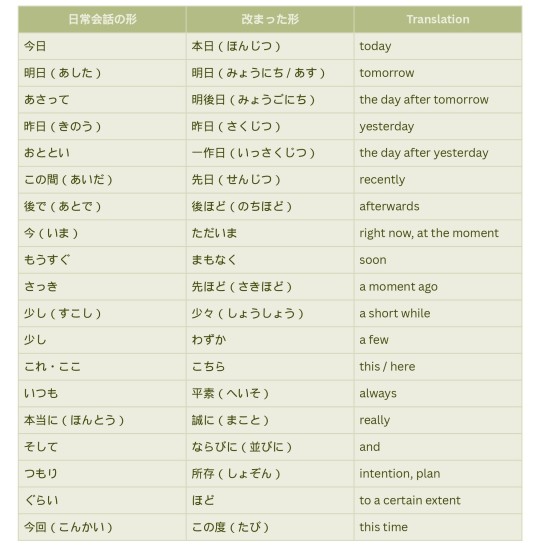
#文法#敬語#japanese langblr#langblr#studyblr#study movitation#learning japanese#japanese vocabulary#japan#japanese#study blog#study notes#language blog#keigo#japanese studyblr#japanese grammar#japanese language#日本語#日本語の勉強#nihongo
384 notes
·
View notes
Text


2024-02-28// ようやく黒ずんだシルバーアクセサリーを磨いた。面白いことに、アクセサリーのお店で働いているといっても、自分ではあまりアクセサリーは持っていない。同僚は本当にいい人ばかりだから、バイトを辞めるときはちょっと寂しいかもしれない。
#日記#japanese langblr#studyblr#study aesthetic#study notes#light academia#pastel academia#japan#japanese#study blog#studyspo#study movitation#japanese studyspo#university#college#books#reading#studying#student#student life#lofi#lofi aesthetic#earrings#silver#jewelry#rose#necklace#日本語
64 notes
·
View notes
Text

This post is an addition to 敬語の5分類|The 5 Types of keigo.
尊敬語の特定形
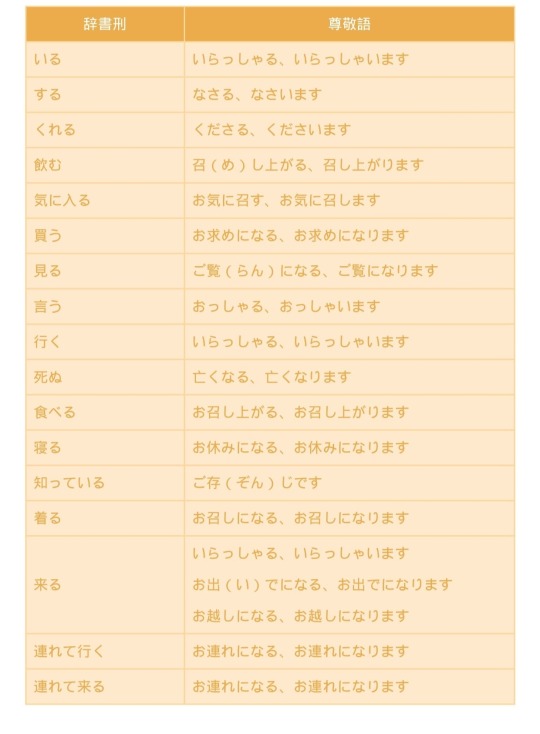
謙譲語Ⅰの特定形
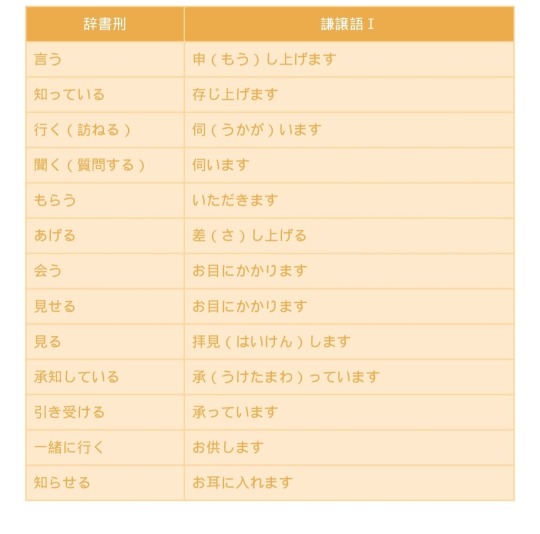
謙譲語Ⅱの特定形
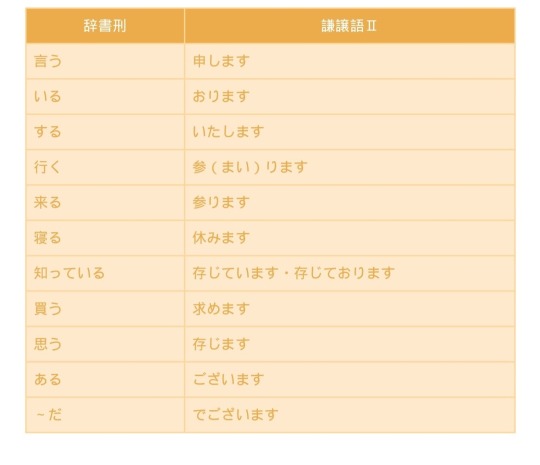
#文法#敬語#japanese langblr#learning japanese#japanese vocabulary#japanese#japanese language#keigo#study notes#japanese studyblr#japanese studyspo#japanese grammar#nihongo#日本語#日本語の勉強
103 notes
·
View notes
Text
敬語の5分類|The 5 Types of keigo
In the Japanese language it is possible to show respect towards another person by replacing words, mostly verbs, with politer equivalents. This can be done by using elevating expressions for the actions of your superior or degrading expressions for your own actions.
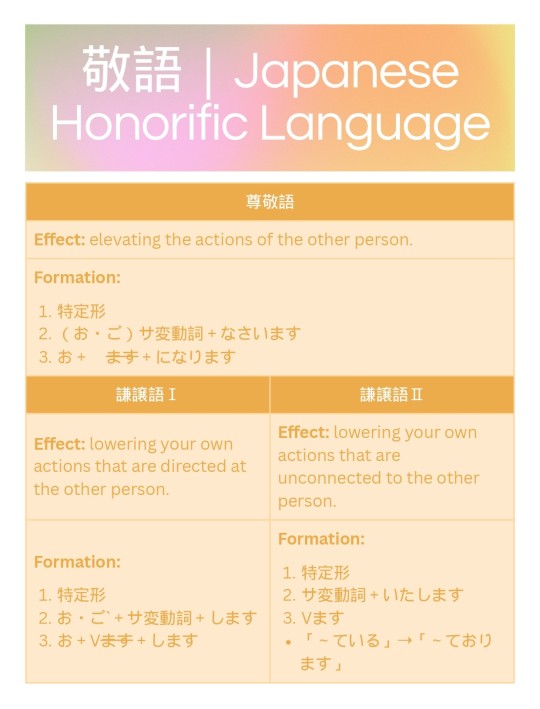
Overview: Verb Formation Rules for sonkeigo 尊敬語, kenjōgo I 謙譲語Ⅰ and kenjōgo II 謙譲語Ⅱ (also known as teichōgo 丁重語).
In a guideline released by the Japanese Agency for Cultural Affairs in the year 2007 keigo has been divided into five types: 尊敬語・謙譲語Ⅰ・謙譲語Ⅱ(丁重語)・丁寧語・美化語. The first three types demonstrate the most complex rules, hence why I summarized them in the chart above for a quick overview. Hereafter, you can find thorough introductions to each type.
尊敬語|Respectful Language
Sonkeigo is the most basic method to pay special respect towards a teacher, a superior or a client. This can be done by switching the verb (refering to the action of your superior) with its passive form.
e.g. 読みます → 読まれます
However, the degree of politeness isn't that high. Hence, it is important to learn the following formation rules as well:
1)特定形 |Special forms
Some verbs have a fixed forms. If a verb has a special form it is to be used.¹
e.g. いる・行く・来る → いらっしゃいます
2)サ変動詞+なさいます
In this context サ変動詞 refers to nominal verbs. Basically, nouns that can be turned into verbs by adding する. It is possible to add お or ご infront of the verb but it can be also omitted if unsure which prefix is the right one.
e.g. 出発する → (ご)出発なさいます
3)お+Ⅴます+になります
This formation rule is for all verbs that do not belong into either of the two categories above. Omitting ます leaves the so-called renyōkei 連用形 or conjunctive form of the verb. Here, the prefix added is always お.
e.g. 待ちます → お待ちになります
It is not uncommon to apply this formation rule to サ変動詞 as well. Depending on the nominal verb お needs to be changed to ご.
e.g. 参加する → ご参加になります
However, there are exceptions. Some nominal verbs are not idiomatic and end up sounding unnatural to native ears.
e.g. 運転する → ご運転になります ✕ 運転する → 運転なさいます 〇
謙譲語 Ⅰ|Humble Language I
Kenjōgo I + II have the opposite effect of sonkeigo. They degrade one's status and are therefore applied only to your own actions or the actions of someone from your inner circle (e.g. a co-worker, or a family member).
In contrast to kenjōgo II, kenjōgo I is used when your action (or the action of someone from your circle) is directed at the person you want to pay respect to. It is also used when you do something for said person.
The formation rules are as listed below:
1)特定形 |Special forms
Some verbs have a fixed forms. If a verb has a special form it is to be used.¹
e.g. 言う → 申し上げます
The translation would be "saying sth. to sb." or "telling sb. sth." implying that your action is directed at the person you want to pay respect to.
2)お・ご+サ変動詞+します
Again, there are some verbs that sound unnatural when this formation is applied.
e.g. ご運転します ✕
In this case, you can formulate the sentence with ~させていただきます or switch to kenjōgo II.
e.g. 運転させていただきます 〇 運転いたします 〇
Note that, depending on the situation ~させていただきます might give of the impression that you are putting yourself down too much. This can result in making your counterpart feel uncomfortable.
3)お+Ⅴます+します
This formation rule is for all verbs that do not belong into either of the two categories above. Omitting ます leaves the so-called renyōkei 連用形 or conjunctive form of the verb. Here, the prefix added is always お.
e.g. 伝える → お伝えします
謙譲語 Ⅱ|Humble Language II
Kenjōgo II is used when your own action is unconnected to the person you want to pay respect to. Therefore, this type of language can often be found in anouncements, news reports or broadcasts elevating its audience. At train stations one often repeated phrase is:
e.g. もうすぐ電車が来る → まもなく電車が参ります
In the example above you can see that not only the verb has been switched with a politer equivalent, but the adverb as well. There are many words that can be switched with politer versions. Unlike verbs, they do not need to be inflected and can be studied like regular vocabulary.
It can also be pointed out that the action does not have to be conducted by the speaker, but can be an object (like in the example above) or a third party as well.
The formation rules are:
1)特定形
Some verbs have a fixed forms. If a verb has a special form it is to be used.¹
e.g. 言う → 申します (as in 私は◯◯と申します)
When introducing yourself you simly "say" or "state" your name. This is not considered an action that is directed at the person you want to pay respect to, hence it falls into the category of kenjōgo II.
2)サ変動詞+いたします
e.g. 応募する → 応募いたします
3)丁寧語
For all verbs that do not fall under the categories above, teineigo is used, or in other words the です・ます form.
e.g. 話す → 話します
In case the ~ている form is used, the degree of politeness can be elevated by replacing it with ~ております which is the special form of いる.
丁寧語|Polite Language
Teineigo is the neutral polite language. You're probably already familiar with this one, since this is the most foolproof way of speaking politely due to its absence of any kind of seesaw principle. It is used everywhere outside of your circle of friends and the safest way to talk to strangers. However, in certain situations it is expected to raise the level of politeness.
e.g. 聞く → 聞きます
美化語|Refined Language
There is a certain number of words, especially nouns, that can be turned into more elegant sounding versions. It can be easily understood by just looking at some examples.
e.g. 金 → お金 酒 → お酒 料理 → ご料理 米 → お米 散歩 → お散歩
Adding the respective prefix お or ご takes away the roughness of a word. This, however, can only be done with a few selected words. Refined words are commonly used in both formal and informal speech.
‾‾‾‾‾‾‾‾‾‾‾‾‾‾‾‾‾‾‾‾‾‾‾‾‾‾‾‾‾‾‾‾‾‾‾‾‾‾‾‾‾‾‾‾‾‾
¹ I compiled all special forms 特定形 that you need to know in this post: 敬語の特定形|Keigo: Special Verb Forms.
#文法#敬語#japanese langblr#langblr#studyblr#study movitation#learning japanese#japanese vocabulary#study aesthetic#light academia#japan#japanese#study blog#study notes#language blog#language#lingusitics#keigo#study motivation#studyspo#japanese studyblr#japanese grammar#japanese language#japanese studyspo#日本語#日本語の勉強#nihongo#learn japanese
255 notes
·
View notes